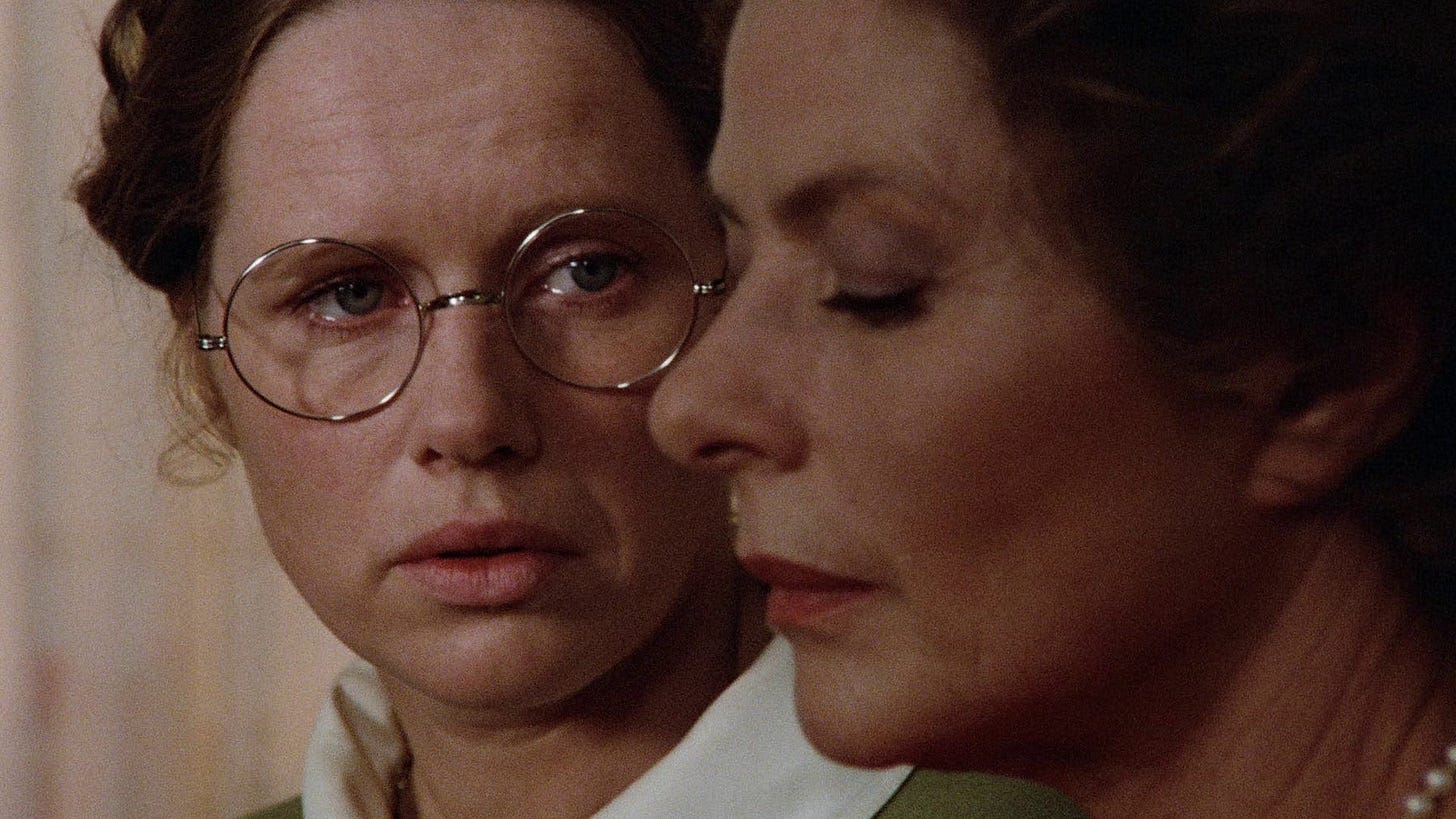100 Movies Every Catholic Should See #58: Autumn Sonata (1978)
Directed by Ingmar Bergman. Starring Ingrid Bergman and Liv Ullmann.
Autumn Sonata is a subtle but towering film. Its greatness is not founded on lavish scenery, stunning visual effects, or an epic music score. Rather, it is founded on Ingmar Bergman’s immense restraint. There is no sex or violence, nor anything graphic. The characters are intense but not exaggerated and the music is appropriate, serving the overall film beautifully without seeking to engineer ‘deep’ feelings in its viewers. Instead of delivering cheap emotional manipulation, the film, through its exceptional screenplay brought to life by visceral performances from Liv Ullmann and Ingrid Bergman, delivers a profoundly cathartic drama.
Some presuppositions on the nature of catharsis: ‘Catharsis,’ derived from the Greek katharos, meaning ‘pure,’ is famously defined by Aristotle as the purification (or purging, or expulsion) of the feelings of pity and fear that are aroused from tragic art.1 Fr. Arthur Little in his book, The Nature of Art or The Shield of Pallas, provides an explanation of how this expulsion comes about. He asserts that the spectator of tragic art is implicitly, or subconsciously, contemplating the beauty of the human soul and that this vision somehow guarantees his soul against evil. This guarantee comes about because “in that instinctively indignant revulsion of the soul against the horror, moral, mental, or material, presented to it on the stage it experiences the wrongness and the essential inconsistency of evil with its own nature.”2 What the soul feels in catharsis is that it is made for Light, not for darkness,3 and because it is made for Light it is, and must be, inherently capable of prevailing against the darkness. This is the purification: the soul witnesses darkness which arouses fear and pity and, along with these, an implicit realization of its ability to overcome evil.
Now, to return to the movie: after the death of her second husband, an aging classical pianist, Charlotte (Ingrid Bergman), returns to Sweden to visit her daughter, Eva (Liv Ullmann). It has been seven years since they have seen each other and during that time much has happened in Eva’s life. Unbeknownst to Charlotte, Eva has taken her younger, mentally impaired sister out of the asylum to live with her. One night, Charlotte and Eva argue intensely over events from the past, reopening many old wounds. Their argument is centered around Charlotte’s failings as a mother. Charlotte had sought to escape the burden of family life by devoting herself to her career as a concert pianist and reveling in the social status that followed from it.
There is no denying that Charlotte is a failure as a mother: she is materialistic, vain, and selfish, she was never present to her family, she cheated on her first husband (Eva’s father), and she forced Eva to abort her first child and leave the father. Furthermore, she placed her other daughter, Helena, into an asylum for a mental illness caused by her own failings. Yet, she also has a simplicity about her. She received no love from her own parents and thus felt incapable of giving it (or at least showing it). As a result, she channeled her emotion into her career as a pianist (this emotion is captured exquisitely by Ingrid Bergman when her character plays Chopin’s Prelude #2). She failed as a mother, and she knows it. She suffers and she knows that her own failures are the cause. She is seemingly sorry, yet also feels incapable of doing anything about it.
Because of the nature of Charlotte and Eva’s argument, it could be tempting to reduce Autumn Sonata to a “relevant” film that comments on the complexities of motherhood vs. career. To do so is not only to misunderstand the film, but to degrade it immensely. First, “relevance” today simply means being consigned to a dustbin in the often not so distant future. Second, to experience the film in such terms raises the wrong questions: “is it saying women should not have careers? Is it saying if women have careers that they should not have children? Is it saying abortion is acceptable? Or that it's an abomination?” No, Autumn Sonata is not concerned with answering those questions. It is not a commentary. Instead, it reaches into the depths of human suffering and presents to its viewers the most challenging mystery of living a Christian life: the terrifyingly impossible command to forgive unconditionally,4 and the appalling misery of failing to do so.
This mystery is masterfully portrayed in the complexity of Eva’s character. She is pleasant and kind toward her mother and she treats everyone in her life with caring dignity. She is also a deeply wounded character. Her trauma clings to her, not only from childhood neglect and her own aborted child, but also from the loss of her second child, who drowned at the age of four. Understandably, Eva holds her mother responsible for much of her suffering. The paradoxical, and almost ironic nature of Eva’s unhappiness, captured so delicately in the film, is this: Eva suffered terribly because she craved her mother’s love and did not receive it. In the darkness of this suffering grew a horrifying, but deeply hidden, bitterness toward her mother. In turn, this bitterness crippled Eva, preventing her from receiving the consoling and genuine love so readily offered to her by her husband. Thus, she blindly perpetuates her own misery.
Contrary to Eva and Charlotte, Helena’s suffering is the result only of others' failures. She suffers in two primary ways. First, she is crippled by a mental illness caused from childhood neglect and abuse. Second, she suffers because of the brokenness in the relationship between her mother and sister. She has forgiven her mother; now she wants the relationship between mother and sister to be healed. Perhaps she sees what few see: unforgiveness and resentment not only cause self-perpetuating misery for the one holding on to them, but are also a roadblock to the healing of the person they are directed at.
In the Gospel of Matthew, after teaching the Lord’s Prayer, Jesus says, “For if you forgive men their offenses, your heavenly Father will also forgive you; But if you do not forgive men, neither shall your Father forgive your offenses.”5 These are strong and frightening words. Forgiveness does not come naturally, which is why it has been aptly said that “to err is human, to forgive, divine.”6 The viewer wonders: how is Eva supposed to forgive her mother? Eva's life is a misery because of her. Charlotte not only failed to love Eva properly as a child but also took away anyone else who would have loved her: her aborted first child, the father of that child, and her younger sister, who was consigned to the asylum. Erasmo Leiva-Merikakis in his commentary on the Gospel of St. Matthew, lends some helpful insight here: “it is not so much a matter of ‘meriting’ pardon juridically by first forgiving others. Rather, I will simply not be able to receive the pardon God gladly offers unless I first dispose my heart to forgive.”7 The viewer sees in Eva’s tragic predicament this inability to forgive and so feels pity for her. Bitterness and resentment are so contrary to what a person’s soul is intended for. Yet, in a cathartic way, the viewer of Autumn Sonata also implicitly recognizes that, given our free will, all evil is a temporary affliction and not a final state of being. Jesus’ direct command to forgive others is not a threat, it is an invitation to choose Light.
This is a paraphrased definition. See Aristotle’s Poetics, Chapter VI, for his full definition of tragedy and catharsis.
Arthur Little, S.J., The Nature of Art or the Shield of Pallas (Longmans, Green and CO. LTD., 1946), 137. This is a book well worth reading for anyone investigating the philosophical nature of art. The central argument of the book is that fine art (termed significant art by Fr. Little) is the virtual contemplation of the human soul in action.
John 1:5.
Matthew 6:14-15.
Matthew 6:14-15.
Alexander Pope, An Essay on Criticism.
Erasmo Leiva-Merikakis, Fire of Mercy, Heart of the Word, Vol 1: Meditations on the Gospel According to Saint Matthew (Ignatius Press, 1996), 263.







Wow!! Really great and thoughtful article. Now I want to watch.